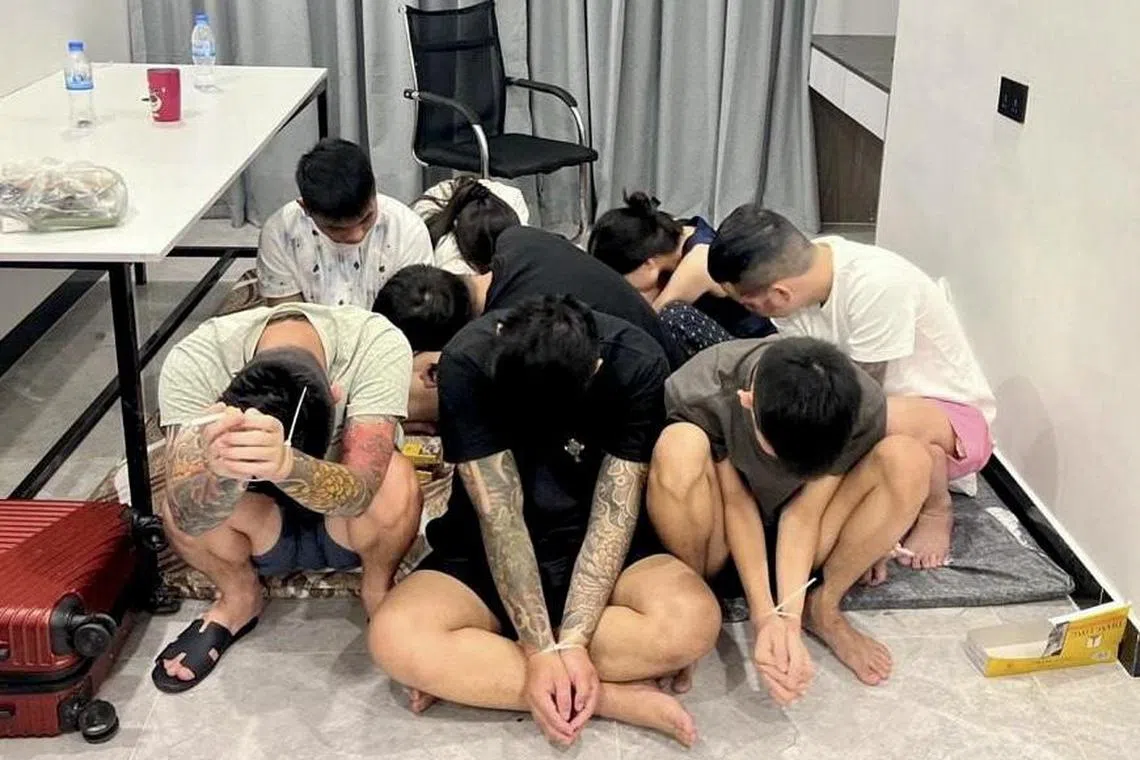UN sounds alarm on S-E Asia scam centre surge
Sign up now: Get ST's newsletters delivered to your inbox

Police checking equipment seized during a raid on a scam centre in Cambodia, on July 17.
PHOTO: AFP
- UN reports human trafficking for forced online criminal activity is rapidly increasing, trapping hundreds of thousands in South-east Asia.
- Victims, including migrants and children, are often arrested for forced crimes; the IOM urges legal reforms to protect survivors.
- Online scamming, estimated at US$40 billion yearly, thrives in regions like Myanmar due to conflict, exploiting vulnerable individuals.
AI generated
GENEVA - Human trafficking for forced criminal activity is growing at an alarming rate, with hundreds of thousands of people trapped in online scamming centres across South-east Asia, the United Nations said on July 30.
Too often, instead of getting help, victims are arrested for crimes they were forced to commit, the head of the UN’s migration agency said on World Day Against Trafficking in Persons.
“Trafficking is a human rights crisis, but it’s more than that. It’s a massive global business that fuels corruption, spreads fear and preys on the most vulnerable,” Ms Amy Pope said.
Her International Organisation for Migration (IOM) agency has witnessed trafficking for forced crime expand with “alarming” speed, she said.
“Right now, across South-east Asia, hundreds of thousands of people are stuck in online scamming compounds,” the IOM chief said.
“These operations bring in an estimated US$40 billion (S$51.8 billion) a year, and many of those trapped are migrants, young job seekers, children, and people with disabilities.”
She said the Geneva-based IOM had helped nearly 3,000 victims rebuild their lives since 2022.
The agency has helped bring people home from the Philippines and Vietnam and supported victims in Thailand, Myanmar, and beyond, Ms Pope said.
But she warned that far more remained stranded.
“To make matters worse, instead of getting help, they’re often arrested, prosecuted and punished. Let me be clear: No one should be jailed for something they were forced to do,” she said.
She urged governments and civil society to step up and get national laws changed so that trafficking survivors could be protected rather than punished – and urged the authorities to go after the traffickers rather than those they exploit.

Suspects are seen with their hands zip-tied after being detained during a police raid on a scam centre in Phnom Penh, Cambodia, on July 16.
PHOTO: EPA
Myanmar’s many-sided civil war – sparked by a 2021 coup – has enabled the rapid growth of lucrative internet fraud factories established in its loosely governed borderlands.
Cyberscam operations lure foreign workers with promises of high-paying jobs but hold them hostage and force them to commit online fraud.
Many of the trafficking victims are Chinese men.
Many people have said they were trafficked into often heavily fortified scam compounds to target victims with romance or business scams on social media, luring them into making untraceable cryptocurrency payments. AFP


